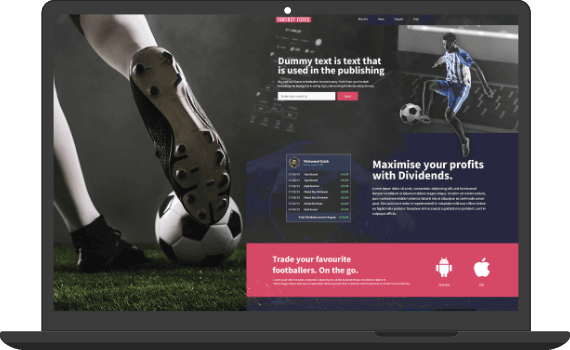tai sodo66
₫9.719.160
tai sodo66 © cung cấp 199k tiền thưởng chào mừng cho người chơi mới. Đăng ký để tham gia các trò chơi bài đổi thưởng và bắt đầu giành chiến thắng!
Product description
Assessing Bookmaker Biases
Bookmakers, like any market participants, can be subject to biases and tendencies that may influence their pricing. Analytical tools can help bettors identify and account for these biases, whether they stem from a bookmaker's risk management strategies, product offerings, or even geographic location.
See more: hitclub vin
Understanding the Odds: How Analytical Tools Help Decode Bookmaker Probabilities
Deconstructing Bookmaker Pricing
Bookmakers employ sophisticated algorithms and models to set their odds, and analytical tools can help bettors understand the underlying logic behind these pricing mechanisms. By analyzing factors such as market sentiment, historical data, and bookmaker tendencies, bettors can gain insights into how bookmakers arrive at their odds, enabling them to identify potential discrepancies or mispriced markets.
Conclusion
The integration of analytical tools into the soccer betting industry has ushered in a new era of data-driven decision-making. By harnessing the power of performance analytics, predictive modeling, and odds analysis, bettors can now make more informed and strategic wagers, identifying value opportunities and mitigating risks more effectively.
Understanding Opponent Strengths and Weaknesses
Successful soccer betting requires not only an understanding of a team's own performance but also a deep analysis of their opponents. Analytical tools can provide valuable insights into an opposing team's strengths, weaknesses, and specific tendencies, allowing bettors to identify potential mismatches or opportunities to exploit.
Diversifying Risk through Portfolio Management
Analytical tools can also assist bettors in managing their risk through portfolio diversification. By evaluating the correlations between different betting markets, bettors can construct a diversified portfolio that minimizes exposure to individual risks and provides a more stable long-term performance.
However, the increasing reliance on analytical tools also brings forth a need for responsible and ethical practices. Regulatory oversight, data privacy considerations, and the mitigation of algorithmic biases will be crucial in ensuring the integrity and fairness of the soccer betting industry.
Exploiting Market Inefficiencies
The soccer betting market is constantly evolving, and analytical tools can help bettors identify and capitalize on market inefficiencies. By monitoring factors such as line movements, betting volume, and public perception, bettors can detect instances where the market may have mispriced the odds, creating opportunities for profitable wagers.
Predictive Modeling
Predictive modeling is another powerful analytical tool in soccer betting. These statistical models leverage historical data and machine learning algorithms to forecast the outcomes of matches, identify potential upsets, and assess the probabilities of various betting outcomes. Sophisticated predictive models can take into account a wide range of factors, including team form, head-to-head records, home-field advantage, and even weather conditions.
See more: app go99
Deciphering the Numbers: Exploring Key Analytical Tools for Soccer Betting

Assessing Injury and Suspension Impact
Injuries and suspensions can significantly impact a team's performance, and analytical tools can help bettors assess the potential implications. By evaluating a player's importance to the team, their replacement options, and historical data on how the team has fared in their absence, bettors can make more informed decisions on how to approach matches affected by these factors.
Building a Winning Strategy: Integrating Analytical Tools into Your Soccer Betting Approach
Developing a Data-Driven Betting Model
Successful soccer betting often requires the development of a comprehensive betting model that incorporates various analytical tools and data sources. By combining performance metrics, predictive algorithms, and odds analysis, bettors can create a structured and systematic approach to their decision-making process.
In the ever-evolving world of sports betting, the soccer industry has witnessed a remarkable shift in recent years. Gone are the days when bettors relied solely on gut feelings and intuition. Today, the rise of analytical tools has revolutionized the way we approach soccer betting, empowering bettors to make more informed and data-driven decisions.
From Amateur to Expert: The Benefits of Employing Analytical Tools in Soccer Betting
Improved Decision-Making Capabilities
By incorporating analytical tools into their soccer betting approach, bettors can enhance their decision-making capabilities, making more informed and data-driven choices. This translates into a higher degree of confidence in their wagers and increased potential for long-term profitability.
The Emergence of Analytical Tools
The advent of technology and the availability of vast data sets have paved the way for the development of sophisticated analytical tools in the soccer betting industry. These tools harness the power of statistical analysis, machine learning, and predictive modeling to provide bettors with a more comprehensive understanding of the game.
The Benefits of Analytical Betting
By embracing analytical tools, bettors can now make more informed and data-driven decisions. These tools offer insights into team performance, player statistics, historical trends, and market dynamics, enabling bettors to identify value and capitalize on opportunities that may have been overlooked with a purely intuitive approach.
Advanced Metrics
In addition to traditional performance metrics, advanced analytical tools have introduced a range of sophisticated metrics to the soccer betting landscape. These include expected goals (xG), which measure the quality of goal-scoring opportunities, and possession-adjusted metrics, which provide a more nuanced understanding of a team's overall performance.
Contextualizing Match Results
When evaluating a soccer team's performance, it's crucial to look beyond the final scoreline. Analytical tools can help bettors delve deeper into the underlying factors that contributed to a team's result, such as shots on target, possession, and pass accuracy. By understanding these contextual elements, bettors can better assess a team's true strengths and weaknesses, leading to more informed betting decisions.
Monitoring Odds Movements
Analytical tools can also assist bettors in tracking and monitoring odds movements over time. By understanding how odds fluctuate in response to various factors, such as team news, public sentiment, and betting activity, bettors can identify opportunities to place bets at advantageous prices or capitalize on market overreactions.
Implementing Risk Management Strategies
By incorporating analytical tools into their risk management strategies, bettors can develop more sophisticated approaches to minimize losses and protect their bankroll. This may include techniques such as diversification, position sizing, and the use of stop-loss orders to mitigate the impact of adverse outcomes.
Performance Analytics
One of the fundamental analytical tools for soccer betting is performance analytics. These metrics delve into team and player statistics, providing a deeper understanding of their strengths, weaknesses, and recent performances. Key performance indicators (KPIs) such as shots on target, possession, pass accuracy, and goal-scoring efficiency can reveal crucial insights about a team's playing style and potential for success.
From Gut Feelings to Calculated Bets: The Rise of Analytical Tools in Soccer

Enhanced Risk Management
Analytical tools provide bettors with a better understanding of risk and variance, enabling them to make more informed decisions about bet sizing, bankroll management, and overall risk exposure. This, in turn, can lead to more sustainable and responsible betting practices.
By embracing the power of analytical tools and navigating the associated risks and challenges, bettors can unlock a new level of success in the dynamic and ever-changing world of soccer betting. The journey from gut feelings to calculated bets has only just begun, and the future of soccer betting is firmly rooted in the intersection of data, technology, and strategic decision-making.
Navigating the Risks: Using Analytical Tools to Manage Variance and Minimize Losses
Understanding Variance and Volatility
Soccer betting, like any form of gambling, is inherently subject to variance and volatility. Analytical tools can help bettors better understand and quantify these risks, enabling them to make more informed decisions about bet sizing, bankroll management, and overall risk exposure.
Beyond the Scoreline: Analyzing Team Performance Metrics for Informed Betting








